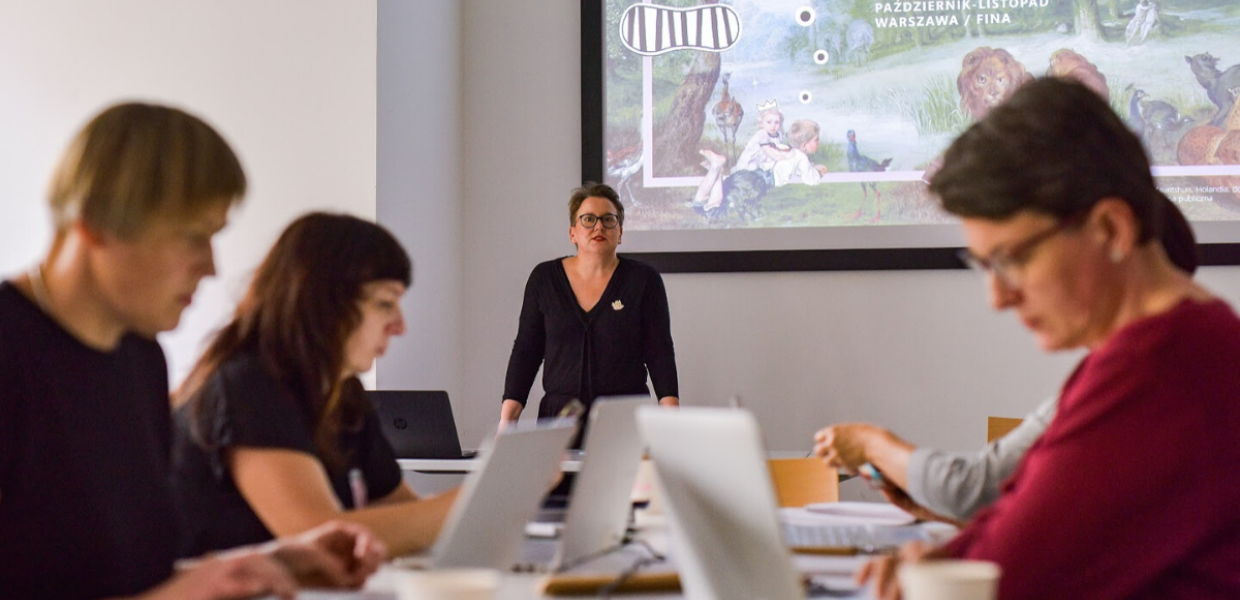Professionals in Focus: Maria Drabczyk
Europeana Members Councillors have diverse jobs and wide experience across the heritage sector, but are united by their passion for digital cultural heritage. In our ‘Professionals in Focus’ series, we speak to our Councillors about their roles, working lives and plans for their time on the Members Council. This month Maria Drabczyk, chief international projects expert at the National Film Archive - Audiovisual Institute Poland, discusses encouraging engagement with collections, addressing ‘puzzles’ when sharing cultural heritage, and the importance of understanding impact.

- Title:
- TuEuropeana 2019, Educational workshop ‘Nauczyciel XXI wieku i nowe technologie w edukacji’
- Creator:
- Bartek Syta for FINA
- Copyright:
- CC BY-SA
How did you enter your role?
It was pure circumstance. I was between jobs, having finished working for a small NGO trying to bridge culture and business, and was searching for a new professional challenge. Before that, I worked for five years for the Polish Ministry of Culture and National Heritage in a team in charge of international cultural policies and collaborations. I am a sociologist by training and as much as I have a passion for policies and strategies (I still do!), I was missing a project-based approach.
A friend tipped me off that there was an opening at the National Audiovisual Institute (now National Film Archive - Audiovisual Institute, in short FINA) for a European project coordinator. The project was called EUscreenXL and they needed someone to lead a work package on dissemination, exploitation and sustainability. Six years later I am on the board of the EUscreen Foundation, a network which facilitates online access to Europe’s audiovisual history through rich and robust digital content and advocates for its use in education, research, media production and public engagement. And the three words that formed the name of my first work package back in 2014 remain the most relevant areas of my work in the archive.
What are you currently working on?
My current role at FINA is built around mostly international initiatives that create online access and encourage use of our archival collections - a task that has gained additional value in the past few months due to the COVID-19 pandemic.
Within the Europeana context, we are currently working on a number of smaller and bigger projects, including Europeana XX , which aims to tell the story of 20th century European societal change. We are also planning a new edition of TuEuropeana, a national project we created five years ago to locally promote the use of Europeana collections in education, science and the creative sector. With EUscreen we are finalising our strategic plan for the next few years.
What are some of the challenges in your role? What are some of your favourite elements?
Somehow the challenges are also my favourite elements! Working on a new project or proposal is like starting a new, complex puzzle. At first, the elements don’t seem to match - how can you combine copyright limitations, technical challenges and lack of resources with your wish to make everything as freely accessible as possible and to create an amazing story relevant to your users? However, with time and the right people gathered around the table, you come up with a way to make them all fit in. That’s my favourite moment - the click of the final puzzle.
What was your motivation for joining the Members Council?
Europeana has been a relevant part of my professional network since I joined the international archival community. The TuEuropeana project made the connection even stronger and somehow turned me into Europeana’s advocate within the Polish cultural heritage community. It’s a role I very much appreciate and genuinely enjoy. EUscreen has also always collaborated closely with the Europeana Foundation, and in time I got involved in a number of activities and various task forces focused on improving use of the collections in various contexts. Joining the Members Council seemed like a natural next step, a chance to learn more and to help shape the community.
What do you plan to do as a Members Councillor?
I come from an audiovisual background so my natural goal is to put those collections in the spotlight of the Europeana ecosystem. I want to support any actions that foster knowledge exchange and development (both technical and curatorial) relevant for the archival audiovisual community.
I am also part of the Steering Group of the Impact Community. I strongly believe in the value of our work, in the stories we tell with our amazing collections and in change we can create in society and in individuals. But as cultural heritage institutions we still need to learn how to better understand and analyse the impact of our actions. Especially now, when, because of the COVID-19 crisis, we all face the urgent need to redefine our approach, find new ways of remaining connected in dialogue with our audiences and stay professionally alive.
As stated in the Europe Day Manifesto, launched by Members of the European Heritage Alliance and co-signed by Europeana, cultural heritage is a powerful catalyst for the future of Europe. We need to start saying this more often out loud - you can join us by signing the Manifesto today. We also need tools and methodology that will help us hold this conversation in a most efficient way. I want to be part of this conversation.


